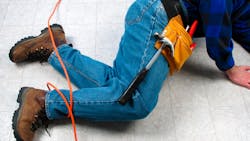Union Carpenters: ‘You’re Pretty Much Screwed if You Get Hurt At Work’
Very little is known about the effects of programs in the construction industry that offer rewards for workers or their supervisors for improved safety records or that punish workers for reporting injuries. A new study sponsored by the Center for Construction Research and Training sheds some light on the subject.
Researchers Hester J. Lipscomb, Ph.D., and Douglas J. Myers, Sc.D., from the Division of Occupational and Environmental Medicine at Duke University Medical Center; James Nolan and Dennis Patterson of the Carpenters District Council of Great St. Louis and Vicinity; and Vince Sticca of the Chicago Regional Council of Carpenters conducted an anonymous survey of 1,020 carpenter apprentices in three union training programs to document the prevalence of their exposure to efforts to hinder injury reporting.
According to Lipscomb et al, 58 percent of the carpenters reported some safety incentive or negative consequence of work-related injuries on their current jobsite. Reporting of work-related injuries was 50 percent less prevalent when workers were disciplined for injury experiences. Researchers also found “considerable evidence of fear of reprisal for reporting injuries.” Worse yet, over 30 percent of the carpenters said injuries “were almost never or rarely reported,” said researchers.
Underreporting a “Huge Issue”
“I think that if we had the opportunity to study other, more vulnerable groups of construction workers, we’d probably find things are worse,” Lipscomb told EHS Today. “Coming from a union work force, where you’d think there’s more safety advocacy, drives the idea home really strongly.”
Even if workers understand they have the right to report injuries, subtle pressures in the workplace may discourage injury reporting. If employees anticipate possible discipline, termination or any other negative consequences, they may become reluctant to report.
The nature of construction work may compound the problem, Lipscomb added. Say a construction worker reports an injury or files a workers’ compensation claim and, once the current project completed, is not hired back for the next job. Whether the employee actually lost out on the job because he previously reported an injury or if he only believes this is the case makes little difference. “The effect is the same,” Lipscomb said. “It keeps workers from feeling they can safely report their injuries.”
"Fired Before You Hit the Ground"
About 15 percent of the surveyed carpenters elected to write in comments in response to a question asking about any other factors that might influence injury reporting or safety on construction worksites. While a handful of these comments were positive – “The company I work for goes above and beyond” and “The GC [general contractor] on my job has an incentive program for reporting and correcting any unsafe practices or hazards on the job site with monthly prizes” – the majority of responses told a different story.
Several of the workers’ comments are excerpted below:
►“I worked for a company that had to maintain a 0% accident policy to be able to keep their con- tract with a major company. I got the impression, which was strongly implied, if I got hurt I was no longer employed.”
►“From experience with many companies, if you get hurt you’re looking for a new job.”
►“The term ‘Fired before you hit the ground’ is used too much in our industry.”
►“Most employers make it difficult to report injuries with subtle hints not outright threats.”
►“They want it faster and if you are injured, go home and don’t report it. There are a lot of other guys in line to replace you.”
►“With my company, people are afraid to report injuries even when they get hurt because they will lose their jobs. Not immediately, but in like 2 or 3 months when it blows over, you’re fired.”
►“They say report all injuries but we all know you have it happen more than once and you’re gone. That’s the same at every company I’ve worked for in the union.”
►“Working my last job I felt that reporting injury would result in lay off. Most people having (a) lost time injury were laid off when they returned to work. Made workers scared to report injuries.”
►“You are pretty much screwed if you get hurt at work. You will probably get worker’s comp but you will most likely never go back to work for the company for an extended period of time.”
Reward Workers for Reporting Hazards
“If we do not learn about these difficult issues, nothing will be done to remedy them,” Lipscomb said. “Workers won’t feel supported and they will continue to feel vulnerable – particularly so in times of economic downturns.”
She suggested that safety incentive programs focusing on hazard identification may do more for worksite safety than focusing on injury rates.
“From the standpoint of theory, it makes more sense to reward workers, supervisors and safety folks for reporting hazards and working toward ameliorating them than to focus on injury [rates] or not reporting injuries,” Lipscomb said. “Rewarding people for indentifying problems before they result in injuries hazardous conditions needs to be addressed, not rewarding people for working safely around them.”
About the Author

Sandy Smith
Sandy Smith is the former content director of EHS Today, and is currently the EHSQ content & community lead at Intelex Technologies Inc. She has written about occupational safety and health and environmental issues since 1990.

Laura Walter
Laura Walter was formerly senior editor of EHS Today. She is a subject matter expert in EHS compliance and government issues and has covered a variety of topics relating to occupational safety and health. Her writing has earned awards from the American Society of Business Publication Editors (ASBPE), the Trade Association Business Publications International (TABPI) and APEX Awards for Publication Excellence. Her debut novel, Body of Stars (Dutton) was published in 2021.

